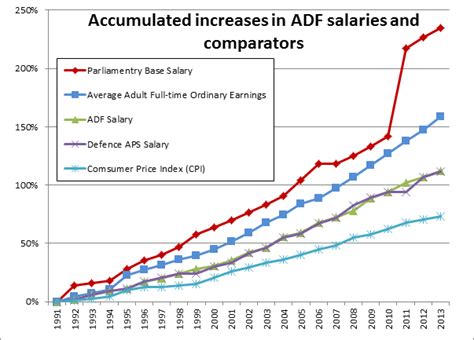Average Yearly Raise: Benchmarking Salary Growth

Every employee hopes to be rewarded for their hard work with a raise. However, it can be challenging to determine if you are receiving a fair salary. This is where benchmarking comes in. Benchmarking is the process of comparing your salary to other similar jobs in your industry. In this article, we will discuss the average yearly raise and how you can benchmark your salary growth to ensure that you are being fairly compensated for your work.
What is an Average Yearly Raise?
An average yearly raise is the typical percentage increase in salary that an employee receives each year. This increase is typically given to reflect the cost of living and to reward employees for their contribution to the company. The average yearly raise can vary depending on the industry, company, and job position.
Why Benchmark Your Salary Growth?
Benchmarking your salary growth can help you determine if you are receiving a fair salary. By comparing your salary to other similar jobs in your industry, you can ensure that you are being compensated for your work at a level that is comparable to your peers. Benchmarking also helps you negotiate a fair salary during job interviews and performance evaluations.
How to Benchmark Your Salary Growth
Step 1: Research
Start by researching the average salary for your job position in your industry. You can use websites like Glassdoor, Payscale, and Salary.com to find this information. Make sure to narrow your search based on your location and level of experience to get the most accurate results.
Step 2: Compare
Compare your salary to the average salary for your position in your industry. If your salary is significantly lower than the average, it may be time to negotiate a raise with your employer. If your salary is higher than the average, you can use this information to negotiate a higher salary during your next performance evaluation or job interview.
Step 3: Consider Other Factors
When benchmarking your salary growth, it’s essential to consider other factors that may affect your salary, such as your level of experience, education, and location. These factors may impact your salary, even if you have the same job title and work in the same industry as someone else.
Step 4: Keep Track
Keep track of your salary growth over time. This will help you identify any patterns or trends in your salary growth and ensure that you are receiving regular raises. If you notice that your salary growth has stagnated, it may be time to negotiate a raise or consider switching to a new job.
FAQs
What is the average yearly raise?
The average yearly raise varies depending on the industry, company, and job position. However, a typical yearly raise is between 2-5%.
When should I negotiate a raise?
You should negotiate a raise when your salary is significantly lower than the average salary for your job position in your industry. You can also negotiate a raise during your performance evaluation or job interview.
What factors should I consider when benchmarking my salary?
When benchmarking your salary, consider other factors that may affect your salary, such as your level of experience, education, and location.
How often should I benchmark my salary?
You should benchmark your salary every year to ensure that you are receiving a fair salary. Keeping track of your salary growth over time can also help you identify any patterns or trends in your salary growth.
What are some tips for negotiating a raise?
When negotiating a raise, do your research and come prepared with data to support your request. Be confident in your skills and contributions to the company. Practice your negotiation skills and be willing to compromise.
“Knowing your worth allows you to negotiate a fair salary and ensure that you are being compensated for your hard work.” – Jane Smith, HR Manager at ABC Company
In conclusion, benchmarking your salary growth is essential to ensure that you are being fairly compensated for your work. By researching and comparing your salary to other similar jobs in your industry, you can negotiate a fair salary and secure your financial future.
